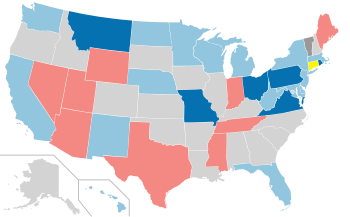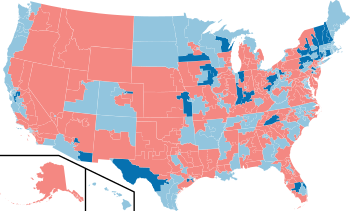
Back ھەڵبژاردنەکانی ویلایەتە یەکگرتووەکانی ئەمریکا (٢٠٠٦) CKB Wahlen in den Vereinigten Staaten 2006 German Elecciones legislativas de Estados Unidos de 2006 Spanish Élections de mi-mandat des États-Unis de 2006 French Elezioni parlamentari negli Stati Uniti d'America del 2006 Italian Amerikaanse congresverkiezingen 2006 Dutch Eleições nos Estados Unidos em 2006 Portuguese Kongresne volitve v Združenih državah Amerike (2006) Slovenian Mellanårsvalet i USA 2006 Swedish Bầu cử Hoa Kỳ 2006 Vietnamese
| ← 2004 2005 2006 2007 2008 → Midterm elections | |
| Election day | November 7 |
|---|---|
| Incumbent president | George W. Bush (Republican) |
| Next Congress | 110th |
| Senate elections | |
| Overall control | Democratic gain |
| Seats contested | 33 of 100 seats |
| Net seat change | Democratic +5 |
 | |
| 2006 Senate election results map Democratic gain Connecticut for Lieberman gain Democratic hold Republican hold Independent hold | |
| House elections | |
| Overall control | Democratic gain |
| Popular vote margin | Democratic +8.0% |
| Net seat change | Democratic +31 |
 | |
| 2006 House election results map Democratic gain Democratic hold Republican hold | |
| Gubernatorial elections | |
| Seats contested | 38 (36 states, 2 territories) |
| Net seat change | Democratic +6 |
 | |
| 2006 gubernatorial election results map Democratic gain Democratic hold Republican hold | |
The 2006 United States elections were held on Tuesday, November 7, 2006, in the middle of Republican President George W. Bush's second term against the backdrop of the war on terror. In a political revolution that ended more than a decade of Republican rule, the Democratic Party was swept into majorities of both chambers of Congress, governorships, and state legislatures. These elections were widely categorized as a Democratic wave.
In the Senate, Democrats won a net gain of six seats to secure a narrow majority in that chamber. Democrats also gained 31 seats in the House of Representatives, and following the election, Nancy Pelosi became the first female Speaker of the House. In the gubernatorial elections, Democrats achieved a net gain of six seats. Nationwide, Republicans failed to win any congressional or gubernatorial seat that was held by a Democrat before the election. This was also the first time since 1994 where a party did not lose a single incumbent in a gubernatorial or congressional election.
Reasons for the Democratic Party's victory included the decline of the public image of George W. Bush, dissatisfaction of his administration's handling of both Hurricane Katrina and the War in Iraq, the beginning of the collapse of the United States housing bubble, Bush's legislative defeat regarding Social Security Privatization and immigration reform, the Republican-controlled Congress's unprecedented and unpopular involvement in the Terri Schiavo case, and a series of scandals in 2006 involving Republican politicians.[1]
- ^ Wolf, Richard (December 7, 2006). "Republicans of '94 revolution reflect on '06". USA Today. Archived from the original on October 12, 2008.